Tourism in Ghana is regulated by the Ministry of Tourism of Ghana. This ministry is responsible for the development and promotion of tourism related activities in Ghana.[1]
Tourist attractions and tourism statistics
%252C_Sekondi-Takoradi.jpg.webp)


Tourist arrivals to Ghana include visitors from South and Latin America, Asia and Europe.[2][3] Tourists come to Ghana to enjoy its all-year-round tropical warm climate and its wildlife. Ghana boasts of waterfalls such as Kintampo waterfalls, and the largest waterfall in West Africa, the Tagbo Falls. Ghana also boasts of palm-lined sandy beaches, caves, mountains, rivers, meteorite impact crater). Other attractions include reservoirs and lakes such as Lake Bosumtwi or Bosumtwi meteorite crater and the largest artificial lake in the world by surface area, Lake Volta. Ghana also has dozens of castles and forts, UNESCO World Heritage Sites, nature reserves and national parks.[2]



The World Economic Forum statistics in 2010 showed that Ghana was ranked 108th out of 139 countries as the world's favourite tourism destination.[4] The country had moved two places up from the 2009 rankings. In 2011, Forbes Magazine, published that Ghana was ranked the eleventh-most friendly country in the world. The assertion was based on a survey conducted in 2010 of a cross-section of travelers. Of all the African countries that were included in the survey, Ghana ranked highest.[4] Ghana ranks as the seventieth-most stable country in the world and as the 58th–most peaceful country in the world.[5]
In 2011 Ghana made $2.19 billion ($2,019,000,000) from the tourism sector, from an estimated 1.1 million international tourist arrivals.[6][7] In 2012, Ghana's tourism sector made $1.7 billion from 993,600 international tourists, providing employment for 359,000 people.[8] Ghana will annually make US$8.3 billion from the tourism sector per year by the year 2027, on the back of an estimated 4.3 million international tourist arrivals.[8][9]
To enter Ghana it is necessary to have a visa authorized by the Government of Ghana, except for certain business incubators and business magnates who are on business trips.[10][11]
Heritage tourism
Heritage tourism in Ghana is led by a festival called the Pan-African Historical Festival or PANAFEST.[12] The festival is a cultural event with the intention of increasing the notion of Pan-Africanism and African development. It consists of the festival itself as well as the celebration surrounding Emancipation Day. PANAFEST primarily takes place in two cities, Elmina and Cape Coast, which were the largest slave-trading forts in the nation. The festival takes place over eight to nine days and begins with a ceremonial wreath laying. Events during PANAFEST include carnival day, a journey of return from those located in other nations, Rita Marley's birthday, an academic lecture on the women and youth, a naming ceremony from people from the diaspora, and finally the "Reverential Night".[13]
PANAFEST is a direct manifestation of Ghanaian culture. It is also the appropriation of it and capitalization by the Rawlings administration. Indeed, Rawlings' developed international cultural festivals such as PANAFEST as a source of income for Ghana through the promotion of tourism in Ghana. It proved to be effective.[14]
Tourism in Ghana: appropriated beginnings
Before the Jerry Rawlings administration in 1981, tourism in Ghana was not an effective source of income for the Ghanaian society and was thus a missed opportunity in helping to diversify the Ghanaian economy. The Rawlings administration saw this area of opportunity and capitalized on it, ultimately appropriating the Ghanaian culture and using it as a source of revenue. Through the restoration of castles that were once used for the slave industry, establishment of public memorials honouring the "illustrious sons" of Ghana, coupled with encouragement from the government via incentives for private investments, the Rawlings administration was effectively able to push tourism forward with the cost of capitalizing on Ghanaian culture.
The tourist industry in Ghana is known to promote sustainable tourism that includes: cultural tourism, heritage tourism, recreational tourism, adventure tourism and event tourism. Cultural tourism focuses on festivals and events, whereas heritage tourism focuses on the history of the slave routes. Recreational tourism allows tourists to explore beaches and theme parks. Adventure tourism takes a look at rain forests and game parks, and event tourism focuses on resources and conferences.
Many of the heritage tourism sites highlight the legacy of the African Diaspora and the social composition of communities. As a result, these studies have impacted the tourists' connection to the heritage tourism sites by providing cultural depth to their traing experience.[14][15]
Significance to national development
Tourism is noted to be a significant contributor to Ghana's economic growth and development.[16][17]
Currency in Ghana and exchange rates
In Ghana the economic system is based on the Ghanaian Cedi (currency symbol GH¢) and the Pesewa (currency symbol Gp).[18] Pesewas are the basic units of Ghanaian currency and cedis are the second tier in their economic system; in other words, pesewas are comparable to the United States' penny and the cedi is comparable to a United States dollar. Although they may be compared in that regard, currency in Ghana is of lower denomination than currency in the United States. 1 Ghanaian Cedi converts to approximately 18¢ in the United States.[19]
Transportation and traveling in Ghana
In Ghana, various methods of transportation are used by tourists. The Tro tro is one method of transportation that usually uses a minivan and are used to travel anywhere throughout Ghana. Though an uncomfortable mode of transportation due to it being usually packed with passengers, it is still a viable option and the cost is fairly low.[20] The "hurry cars" are private cars that have set destinations and wait for passengers that are going to the set destination of the hurry car. They are typically found by transport stations and is definitely a more comfortable method of travel as opposed to a Tro Tro. The drivers of hurry cars will usually hold signs or give some type of information letting passengers know the destination they are set to go.[20]
Uber, Bolt[21] and Yango are also available for those wishing to pay slightly more.
Major tourist sites
.JPG.webp)
- Aburi Botanical Gardens – National Park
- Kakum National Park – National Park
- Digya National Park – National Park
- Mole National Park – National Park
- Ankasa National park – National Park
- Cape Coast Castle – UNESCO World Heritage Site
- Elmina Castle – UNESCO World Heritage Site
- Nzulezo – UNESCO World Heritage Site
- Bonwire – home of Asante kente cloth
- Shai Hills Resource Reserve – a resource reserve
- Lake Bosomtwi – a natural lake
- Kintampo waterfalls – waterfalls
- Boabeng Fiema Monkey Sanctuary – village where monkeys are revered
- Larabanga Mosque – one of the oldest in Ghana
- Kwame Nkrumah Mausoleum – refurbished and reopened in July 2023
Gallery
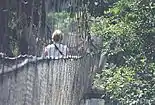 Kakum National Park – National Park.
Kakum National Park – National Park.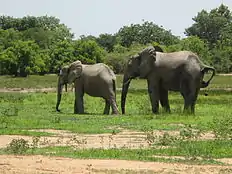 Mole National Park – National Park.
Mole National Park – National Park.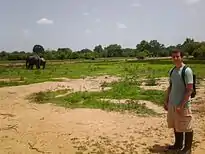 Mole National Park Tourism in Ghana.
Mole National Park Tourism in Ghana.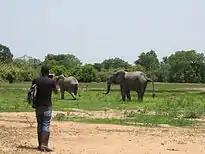 Tourist taking photo of elephants with iPad at Mole National Park in Ghana.
Tourist taking photo of elephants with iPad at Mole National Park in Ghana.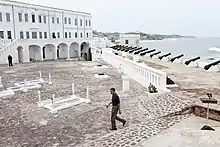 Cape Coast Castle – UNESCO World Heritage Site.
Cape Coast Castle – UNESCO World Heritage Site.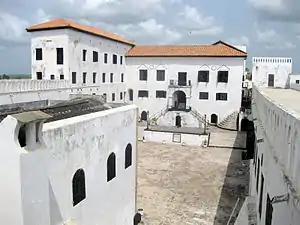 Elmina Castle – UNESCO World Heritage Site.
Elmina Castle – UNESCO World Heritage Site.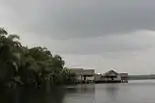
.jpg.webp)
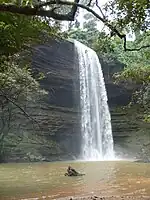 Boti Waterfalls.
Boti Waterfalls.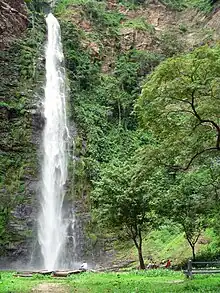
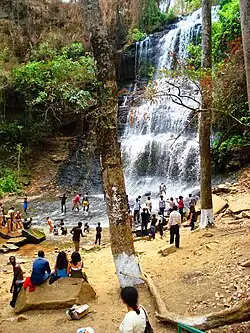



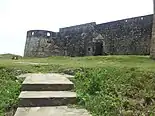
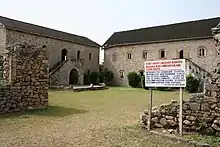

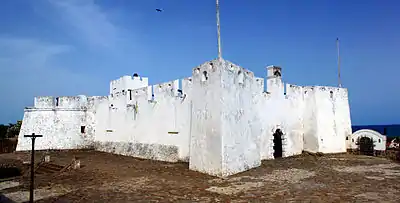

See also
Notes and references
- ↑ "Ministry of Tourism & Modernization of The Capital City". www.ghanaweb.com. Retrieved 3 June 2014.
- 1 2 "Trade Expo International Ghana". uniquetrustex.com. Archived from the original on 1 May 2013. Retrieved 3 June 2014.
- ↑ GTonline (5 August 2022). "Ghana records 400,000 tourist arrivals in 1st quarter 2022 – Dr Awal". Ghanaian Times. Retrieved 6 May 2023.
- 1 2 "Forbes: Ghana is eleventh friendliest nation". www.vibeghana.com. Retrieved 3 June 2014.
- ↑ "About the Global Peace Index". Vision of Humanity. 2013.
- ↑ Sakyi, Kwesi Atta (29 November 2012). "Tapping Deep into our Tourism Potential in Ghana". ghanaweb.com. Retrieved 3 June 2014.
- ↑ "We Are Serious About Overcoming The Challenges Confronting Tourism Development". Ministry of Tourism Ghana. ghana.gov.gh. Retrieved 3 June 2014.
- 1 2 "Ghana To Earn 8.3 Billion USD From Tourism By 2027". ghanaonlinenews.com. 3 April 2014. Archived from the original on 14 August 2016. Retrieved 3 June 2014.
- ↑ "How Ghana's Year Of Return Campaign Put Black Destinations In The Spotlight – Free Press of Jacksonville". jacksonvillefreepress.com. Retrieved 28 April 2020.
- ↑ Harvard quotation. Belda. 2004. : 24
- ↑ McCrorey, Rashad (26 March 2020). "I'm a Black American stuck in Ghana during the COVID-19 pandemic". TheGrio. Retrieved 20 April 2020.
- ↑ Panafest website.
- ↑ GNA (10 October 2022). "PANAFEST 2023 launched". Ghana News Agency. Retrieved 6 May 2023.
- 1 2 Jemima., Pierre (2013). The predicament of blackness : postcolonial Ghana and the politics of race. The University of Chicago Press. ISBN 9780226923024. OCLC 819853928.
- ↑ Yankholmes, A., & McKercher, B. (2015). "Understanding visitors to slavery heritage sites in Ghan". Tourism Management. 51: 22–32. doi:10.1016/j.tourman.2015.04.003.
{{cite journal}}: CS1 maint: multiple names: authors list (link) - ↑ "Recreation and Tourism – Ghana Investment Promotion Centre – GIPC". Retrieved 6 May 2023.
- ↑ GNA (14 September 2022). "Tourism, Arts and Culture to contribute $4 billion to economy by 2024". Ghana News Agency. Retrieved 6 May 2023.
- ↑ "GHS – Ghanaian Cedi rates, news, and tools". XE. Retrieved 25 February 2017.
- ↑ "XE Currency Converter: GHS to USD". XE. Retrieved 25 February 2017.
- 1 2 "Local Transportation Ghana". Easy Track Ghana. 25 February 2017. Retrieved 25 February 2017.
- ↑ "Bolt in Accra". Bolt. Retrieved 13 May 2023.
- ↑ "Trade Expo International". UniqueTtrustex. Archived from the original on 1 May 2013. Retrieved 3 June 2014.
External links
 Ghana travel guide from Wikivoyage
Ghana travel guide from Wikivoyage- Ministry of Tourism, Arts & Culture
- K. Effah, "Ghana Named As One Of Top Travel Destinations", Yen.